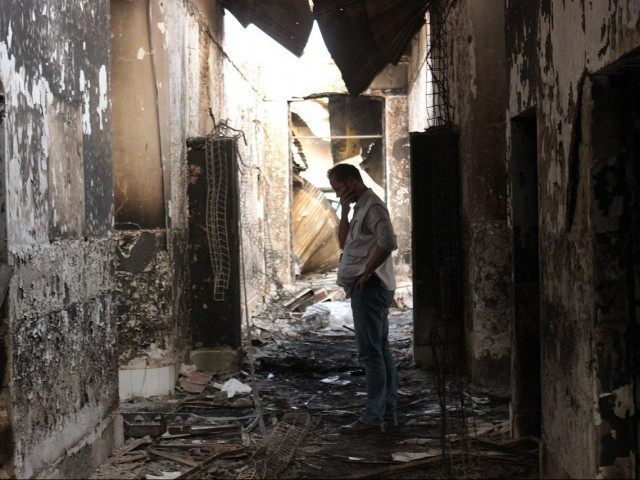WASHINGTON, D.C. — The blame for the accidental bombing of a Doctors Without Borders hospital in the Afghan city of Kunduz has fallen on some American troops who, as a result, have been suspended from their duties and are under investigation by the military for not following the rules of engagement during the strike, the top commander of U.S.-led troops in Afghanistan told reporters.
U.S. Army Gen. John Campbell noted that the unspecified number of U.S. troops may be facing disciplinary action “in accordance with standard military justice and administrative practices.”
“I won’t discuss individual cases because our system requires fairness and the discretion of individual decision-makers. I can tell you that those individuals most closely associate with the incident have been suspended from their duties, pending consideration and disposition of administrative and disciplinary matters,” said the top U.S. general in Afghanistan.
“We have learned from this terrible incident. We’ll also take appropriate administrative and disciplinary action through a process that is fair and thoroughly considers the available evidence,” he added. “The cornerstone of our military justice system is the independence of decision-makers following a thorough investigation such as this one.”
The commander of U.S. and NATO troops in Afghanistan made those comments while briefing reporters at the Pentagon Wednesday via a live feed from Kabul on the results of an investigation into the 29-minute strike that killed 30 people on Oct. 3 and sparked condemnation by the international community.
After making a statement, Campbell deferred all questions from reporters to his spokesman, Brig. Gen. Wilson Shoffner, saying he was still in the process of reviewing the investigative report.
The spokesman declined to say how many U.S. troops were suspended, adding, “We have to allow for due process for those involved.” He also failed to elaborate on which specific rules of engagement were violated.
Gen. Campbell was able to provide an accounting of the events that led to the tragedy.
He told reporters that the strikes by an Air Force AC-130 gunship was a mistake and that U.S. troops intended to hit enemy combatants at a different building.
“No nation does more to prevent civilian casualties than the United States, but we failed to meet our own high expectations on October 3,” he told reporters. “This was a tragic, but avoidable accident caused primarily by human error” and “compounded by systems and procedural failures.”
“U.S. forces would never intentionally strike a hospital or other protected facilities,” added Campbell. “Our deepest condolences go to all of the individuals and families that were affected by this tragic incident. We will offer our assistance to Doctors Without Borders in rebuilding the hospital in Kunduz.”
Gen. Campbell said a number of problems contributed to the tragedy, including “fatigue and high operation tempo” of U.S. Special Operations Forces (SOF) on the ground who had been fighting for five straight days and nights, the malfunction of instruments aboard the AC-130 warplane, and the decision to skip a pre-flight briefing that would have alerted pilots to the location of the hospital, which was on a no-strike list.
“As the aircraft arrived in the vicinity of Kunduz, the aircrew believe it was targeted by a missile, forcing the aircraft to move away from its normal orbit to an orbit approximately eight miles from the mission area,” he explained. “This degraded the accuracy of certain targeting systems which later contributed to the misidentification of the MSF trauma center.”
Doctors Without Borders is also known by the acronym of its French name — Medecins San Frontieres (MSF).
“The physical description” of the intended targeted “provided by the Afghan SOF to the U.S. SOF commander roughly matched the description of the MSF trauma center as seen by the aircrew,” noted the general. “At night, the aircrew was unable to identify any signs of the hospital’s protected status.”
He said that the aircrew ultimately concluded that the MSF trauma center was the intended target — a former Afghan National Directorate of Security (NDS) headquarters building that was believed to be occupied by Taliban insurgents.
“The strike began at 2:08 a.m. At 2:20 a.m., a SOF officer at Bagram received a call from MSF, advising that their facility was under attack,” explained Campbell. “It took the headquarters and the U.S. special operations commander until 2:37 a.m. to realize the fatal mistake. At that time, the AC-130 had already ceased firing. The strike lasted for approximately 29 minutes.”
According to Campbell, the report determined that the commander of the U.S. Special Operations Forces was the one who requested that the American warplane fire at the hospital.
“The report found that, under the circumstances, the U.S. SOF commander lacked the authority to direct the aircrew to engage the facility,” he added. “The investigation also found that the U.S. SOF commander relied primarily upon information provided by Afghan partners and was unable to adequately distinguish between the NDS headquarters building at the MSF Trauma Center.”
In a statement issued Wednesday, Doctors Without Borders said the mistakes detailed by Campbell amount to “gross negligence” and “violations of the rules of war.”

COMMENTS
Please let us know if you're having issues with commenting.